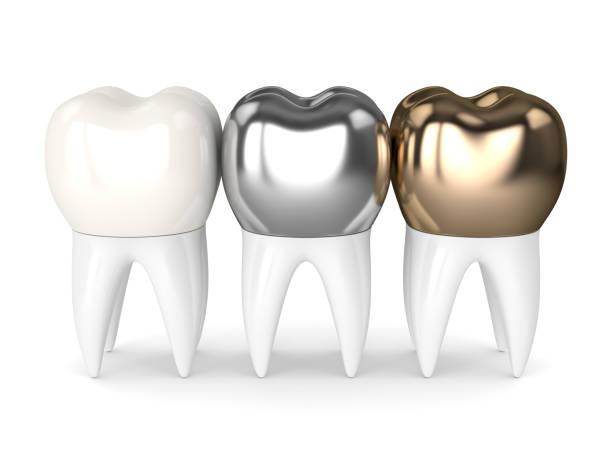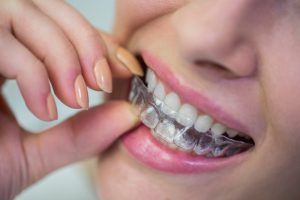Dental crowns are versatile therapeutic solutions that transform damaged or decayed teeth into strong, functional, and aesthetically pleasing structures.
Let’s explore everything you need to know about dental crowns, including their types, benefits, and the process of getting them.
What are Dental Crowns?
A dental crown is like a tooth cap covering a broken, damaged, or weakened tooth structure. Crowns are also placed over dental implants or after a root canal to strengthen the brittle tooth structure. Crowns are made from various materials, including metal, resin, and porcelain.
A crown’s average life is between five and 15 years if maintained well. A dental crown artificially replicates a tooth like a cap and restores weak, broken, and grossly destructed teeth.
To ensure a perfect fit, a dentist carefully removes a small amount of the outer layer of the tooth, creating space for the crown. Depending on the type of crown chosen, dental labs and technicians carry out this process, which involves using materials such as resin, metal, or porcelain.

Dental Crown Functions:
- Strengthen a weak tooth structure
- To strengthen and support cracked teeth
- Restore a broken tooth
- Support for a dental bridge
- Over a stained or discolored tooth
- To reinforce root canal-treated teeth
- As a cover over a dental implant
Types of Dental Crowns
There are different types of tooth caps. The choice of crown depends on your personal preference and needs.

Metal crowns
Dental crowns are made of gold, palladium, nickel, or chromium. Metal crowns are resistant to chipping, breakage, or wear. They are minimum in thickness and require little removal of the outer tooth structure called enamel.
Metal crowns are more resistant to biting and chewing forces for the molars. However, they are not aesthetic because of the metallic color’s visibility. They are preferred only for teeth that are not visible and cannot be used for front teeth.
Porcelain-Fused-To-Metal (PFM) Crowns
Porcelain-fused-to-metal (PFM) crowns have the dual benefits of metal’s durability and the porcelain’s aesthetics. These PFM crowns match the natural shade of teeth. PFM crowns have porcelain covering the inner metal. Porcelain coating may chip off due to biting forces, exposing the metal below.
PFM crowns may also wear away the enamel on the opposing teeth they bite on. As they are thicker than metal crowns, they must remove subsequent amounts of enamel. This can lead to sensitivity if the underlying tooth is not root canal treated.
Ceramic Crowns
The entire core of the ceramic crown is made of ceramic instead of metal, and layers of porcelain are added.
All-ceramic or porcelain crowns
All ceramic or porcelain crowns are natural and aesthetic, just like enamel. A ceramic crown is commonly made using zirconium dioxide. Zirconia crowns are durable and can withstand heavy forces compared to other crowns. They are mild on opposing teeth, causing less wear on them.
Same-day Dental Crowns
CAD/CAM (computer-aided design and manufacturing) technology helps make crowns in dental offices in a single visit. The software assists dentists in making digital dental impressions of teeth and then uses these impressions to design a custom crown. The image files are sent to an on-site milling machine, which crafts new crowns from a solid ceramic block. The main advantage of CAD/CAM technology is that a dental crown is delivered in a single visit.
All-Resin Crowns
Resin dental crowns are less expensive but fragile and less resistant to breakage. Resin is also used to make temporary crowns.
Procedure for Dental Crown
Dental crowns are applied within several visits. Let’s understand the process during every visit.
Tooth Preparation
During the initial visit, the dentist removes the outer layer of the tooth, enamel, to prepare it for a crown. This creates space for placing a new crown over the tooth and ensures a proper fit. The tooth’s core must be filled with a filling material to strengthen it.

Dental Impression
Impressions are reproductions of teeth made with gel or rubber-like impression material. They may be taken with a gel-like material or digital impressions with a digital scanner. These impressions are sent to the lab, where a technician will fabricate a custom dental crown.
![]()
Temporary Crown Placement.
A dental lab takes a week or more to fabricate a new crown. While the final crown is being delivered, a temporary crown made of resin or acrylic is placed for the time being.
Final Placement
When the lab fabricates the final crown, the temporary crown is removed. The shape, color, and fit of the crown are evaluated. The new crown is cemented on the tooth using dental adhesive cement.
Advantages of Dental Crowns
- Strength and Durability: Dental crowns restore the structural integrity of damaged teeth, allowing for normal chewing and biting function.
- Natural Appearance: With advancements in dental technology, crowns can be customized to match the color, shape, and transparency of natural teeth, ensuring a seamless blend with your smile.
- Longevity: With proper care and maintenance, dental crowns can last many years, providing lasting benefits.
- Protection: Crowns provide additional protection for weakened or vulnerable teeth, reducing the risk of further damage or decay.
- Improved Confidence: Dental crowns can boost self-esteem and confidence in social and professional settings by restoring the appearance and function of your smile.
Disadvantages of Dental Crowns
- Removal of natural tooth enamel can lead to tooth sensitivity
- Fracture or breakage
- Reinfection or tissue irritation due to improper fit and food lodgement or trauma.
- Allergic reaction
- Some types of crowns are expensive.
Conclusion
Dental crowns are an effective way to restore damaged teeth, strengthen weakened ones, and improve the appearance of your smile.
Ready to restore your smile with dental crowns?
Contact Norwood Dental to schedule your appointment. Our experienced team will guide you and create a customized treatment plan tailored to your needs.
Experience the transformative power of our advanced technology and personalized care in enhancing your smile.




